- Home
- Elif Shafak
The Forty Rules of Love Page 11
The Forty Rules of Love Read online
Page 11
I was a naked tree. My skin, my organs, my face falling apart. Every day another part of my body abandoned me. And for me, unlike the maple tree, there would be no spring in which I would blossom. What I lost, I lost forever. When people looked at me, they didn’t see who I was but what I was missing. Whenever they placed a coin in my bowl, they did so with amazing speed and avoided any eye contact, as if my gaze were contagious. In their eyes I was worse than a thief or a murderer. As much as they disapproved of such outlaws, they didn’t treat them as if they were invisible. When it came to me, however, all they saw was death staring them in the face. That’s what scared them—to recognize that death could be this close and this ugly.
Suddenly there was a great commotion in the background. I heard somebody yell, “He is coming! He is coming!”
Sure enough, there was Rumi, riding a horse as white as milk, wearing an exquisite amber caftan embroidered with golden leaves and baby pearls, erect and proud, wise and noble, followed by a throng of admirers. Radiating an air of charisma and confidence, he looked less like a scholar than a ruler—the sultan of the wind, the fire, the water, and the earth. Even his horse stood tall and firm, as if aware of the distinction of the man he carried.
I pocketed the coins in my bowl, wrapped my head so as to leave half of my face in the open, and entered the mosque. Inside, it was so packed it seemed impossible to breathe, let alone find a seat. But the one good thing about being a leper was that no matter how crowded a place, I could always find a seat, since nobody wanted to sit next to me.
“Brothers,” Rumi said, his voice rising high, sweeping low. “The vastness of the universe makes us feel small, even inconsequential. Some of you might be asking, ‘What meaning could I, in my limitedness, possibly have for God?’ This, I believe, is a question that has occurred to many from time to time. In today’s sermon I want to generate some specific answers to that.”
Rumi’s two sons were in the front row—the handsome one, Sultan Walad, who everyone said resembled his late mother, and the young one, Aladdin, with an animated face but curiously furtive eyes. I could see that both were proud of their father.
“The children of Adam were honored with knowledge so great that neither the mountains nor the heavens could shoulder it,” Rumi continued. “That is why it says in the Qur’an, Truly We offered the trust to the heavens and the earth and the mountains, but they refused to bear it because they were afraid of it. Only man took it up. Having been given such an honorable position, human beings should not aim any lower than what God had intended.”
Pronouncing his vowels in that strange way only the educated are capable of, Rumi talked about God, assuring us that He dwelled not on a distant throne in the sky but very close to each and every one of us. What brought us even closer to God, he said, was none other than suffering.
“Your hand opens and closes all the time. If it did not, you would be paralyzed. Your deepest presence is in every small contracting and expanding. The two are as beautifully balanced and coordinated as the wings of a bird.”
At first I liked what he said. It warmed my heart to think of joy and sorrow as dependent on each other as a bird’s wings. But almost instantly I felt a wave of resentment rise up in my throat. What did Rumi know about suffering? As the son of an eminent man and heir to a wealthy, prominent family, life had always been good to him. I knew he had lost his first wife, but I didn’t believe he had ever experienced real misfortune. Born with a silver spoon in his mouth, raised in distinguished circles, tutored by the best scholars, and always loved, pampered, and admired—how dare he preach on suffering?
With a sinking heart, I realized that the contrast between Rumi and me couldn’t be greater. Why was God so unfair? To me He had given poverty, sickness, and misery. To Rumi riches, success, and wisdom. With his flawless reputation and royal demeanor, he hardly belonged to this world, at least not to this city. I had to cover my face if I didn’t want people to be revolted by the sight of me, while he shone in public like a precious gem. I wondered how he would fare if he were in my shoes? Had it ever occurred to him that even someone as perfect and privileged as he could someday tumble and fall? Had he ever contemplated how it would feel to be an outcast, even for one day? Would he still be the great Rumi if he had been given the life I was given?
With each new question, my resentment rose, sweeping away whatever admiration I might otherwise have had for him. Bitter and petulant, I stood up and pushed my way out. Several people in the audience eyed me curiously, wondering why I was leaving a sermon that so many others were dying to attend.
Shams
KONYA, OCTOBER 17, 1244
Beholden to the peasant who dropped me off at the town center, I found myself and my horse a place to stay. The Inn of Sugar Vendors seemed just what I needed. Of the four rooms I was shown, I chose the one with the fewest possessions, which consisted of a sleeping mat with a moldy blanket, an oil lamp that was sputtering its last, a sun-dried brick that I could use as a pillow, and a good view of the whole town up to the base of the surrounding hills.
Having thus settled down, I roamed the streets, amazed at the mixture of religions, customs, and languages permeating the air. I ran into Gypsy musicians, Arab travelers, Christian pilgrims, Jewish merchants, Buddhist priests, Frankish troubadours, Persian artists, Chinese acrobats, Indian snake charmers, Zoroastrian magicians, and Greek philosophers. In the slave market, I saw concubines with skin white as milk and hefty, dark eunuchs who had seen such atrocities that they had lost their ability to speak. In the bazaar I came across traveling barbers with bloodletting devices, fortune-tellers with crystal balls, and magicians who swallowed fire. There were pilgrims on their way to Jerusalem and vagrants who I suspected were runaway soldiers from the last Crusades. I heard people speak Venetian, Frankish, Saxon, Greek, Persian, Turkish, Kurdish, Armenian, Hebrew, and several other dialects I couldn’t even distinguish. Despite their seemingly endless differences, all of these people gave off a similar air of incompleteness, of the works in progress that they were, each an unfinished masterwork.
The whole city was a Tower of Babel. Everything was constantly shifting, splitting, coming to light, transpiring, thriving, dissolving, decomposing, and dying. Amid this chaos I stood in a place of unperturbed silence and serenity, utterly indifferent to the world and yet at the same time feeling a burning love for all the people struggling and suffering in it. As I watched the people around me, I recalled another golden rule: It’s easy to love a perfect God, unblemished and infallible that He is. What is far more difficult is to love fellow human beings with all their imperfections and defects. Remember, one can only know what one is capable of loving. There is no wisdom without love. Unless we learn to love God’s creation, we can neither truly love nor truly know God.
I roamed the narrow alleys where artisans of all ages toiled in their small, dingy stores. In every place I visited, I overheard the townspeople talk about Rumi. How did it feel, I wondered, to be this popular? How did it affect his ego? My mind busy with these questions, I strolled in the opposite direction from the mosque where Rumi was preaching. Gradually the surroundings began to change. As I moved northward, the houses became more dilapidated, the garden walls falling down, and the children more raucous and unruly. The smells changed, too, getting heavier, more garlicky and spicy. Finally I stepped into a street where three odors loomed in the air: sweat, perfume, and lust. I had reached the seamy side of town.
There was a ramshackle house atop the steep cobbled street, the walls supported by bamboo pillars, the roof of thatched grass. In front of the house, a group of women sat chatting. When they saw me approach, they eyed me curiously, looking half amused. Beside them was a garden with roses of every color and shade imaginable and the most amazing smell. I wondered who tended to them.
I didn’t have to wait too long to learn the answer. No sooner had I reached the garden than the entrance door of the house was flung open and a woman dashed out. She was heavy-jowled, tall
, and enormously fat. When she squinted, the way she did now, her eyes were lost in rolls of flesh. She had a thin, dark mustache and thick sideburns. It took me a while to comprehend that she was both man and woman.
“What do you want?” the hermaphrodite asked suspiciously. Her face was in constant flux: One moment it looked like the face of a woman; then the tide came back, replacing it with the face of a man.
I introduced myself and asked her name, but she ignored my question.
“This is no place for you,” she said, waving her hands as if I were a fly she’d like to chase away.
“Why not?”
“Don’t you see this place is a brothel? Don’t you dervishes take an oath to stay away from lust? People think I wallow in sin here, but I give my alms and close my doors in the month of Ramadan. And now I’m saving you. Stay away from us. This is the filthiest corner in town.”
“Filth is inside, not outside,” I objected. “Thus says the rule.”
“What are you talking about?” she croaked.
“It is one of the forty rules,” I tried to explain. “Real filth is the one inside. The rest simply washes off. There is only one type of dirt that cannot be cleansed with pure waters, and that is the stain of hatred and bigotry contaminating the soul. You can purify your body through abstinence and fasting, but only love will purify your heart.”
The hermaphrodite was having none of it. “You dervishes are out of your minds. I’ve got all sorts of customers here. But a dervish? When frogs grow beards! If I let you linger, God will raze this place to the ground and put a curse on us for seducing a man of faith.”
I couldn’t help chuckling. “Where do you get these ridiculous ideas? Do you think God is an angry, moody patriarch watching us from the skies above so that He can rain stones and frogs on our heads the moment we err?”
The patron pulled at the ends of her thin mustache, giving me an annoyed look that verged on meanness.
“Don’t worry, I’m not here to visit your brothel,” I assured her. “I was just admiring your rose garden.”
“Oh, that”—the hermaphrodite shrugged dismissively—“is the creation of one of my girls, Desert Rose.”
With that, the patron gestured to a young woman sitting among the harlots ahead of us. Delicate chin, pearl-luster skin, and dark almond eyes clouded with worry. She was heartbreakingly beautiful. As I looked at her, I had a sense she was someone in the process of a big transformation.
I dropped my voice to a whisper so that only the patron could hear me. “That girl is a good girl. One day soon she’ll embark on a spiritual journey to find God. She’ll abandon this place forever. When that day comes, do not try to stop her.”
The hermaphrodite looked at me flabbergasted before she burst out, “What the hell are you talking about? Nobody is telling me what to do with my girls! You better get the hell out of here. Or else I’m calling Jackal Head!”
“Who’s that?” I asked.
“Believe me, you wouldn’t want to know,” the hermaphrodite said, shaking her finger to emphasize her point.
Hearing the name of this stranger made me shiver slightly, but I didn’t dwell on it. “Anyway, I’m leaving,” I said. “But I’ll come back, so don’t be surprised next time you see me around. I’m not one of those pious types who spend their whole lives hunched on prayer rugs while their eyes and hearts remain closed to the outside world. They read the Qur’an only on the surface. But I read the Qur’an in the budding flowers and migrating birds. I read the Breathing Qur’an secreted in human beings.”
“You mean you read people?” The patron laughed a halfhearted laugh. “What kind of nonsense is that?”
“Every man is an open book, each and every one of us a walking Qur’an. The quest for God is ingrained in the hearts of all, be it a prostitute or a saint. Love exists within each of us from the moment we are born and waits to be discovered from then on. That is what one of the forty rules is all about: The whole universe is contained within a single human being—you. Everything that you see around, including the things you might not be fond of and even the people you despise or abhor, is present within you in varying degrees. Therefore, do not look for Sheitan outside yourself either. The devil is not an extraordinary force that attacks from without. It is an ordinary voice within. If you get to know yourself fully, facing with honesty and hardness both your dark and bright sides, you will arrive at a supreme form of consciousness. When a person knows himself or herself, he or she knows God.”
Crossing her arms above her chest, the hermaphrodite leaned forward and squinted at me menacingly.
“A dervish who preaches to harlots!” she grunted. “I warn you, I’m not going to let you badger anyone around here with your silly ideas. You better stay away from my brothel! Because if you don’t, I swear to God, Jackal Head will cut off that sharp tongue of yours and I’ll eat it with pleasure.”
Ella
NORTHAMPTON, MAY 28, 2008
Befitting her general mood, Ella woke up sad. But not sad as in weepy and unhappy, only sad as in unwilling to smile and take things lightly. She felt as though she had reached a milestone she was not prepared for. As she was brewing coffee in the kitchen, she took her list of resolutions out of the drawer and scanned through it.
Ten Things to Do Before Turning Forty
Improve your time management, be better organized, and be determined to make the most of your time. Buy a new day planner. (Accomplished)
Add mineral supplements and antioxidants to your diet. (Accomplished)
Take action for fewer wrinkles. Try alpha hydroxy products, and start using the new L’Oréal cream. (Accomplished)
Change the upholstery, buy new plants, get new cushions. (Accomplished)
Evaluate your life, values, and beliefs. (Half accomplished)
Eliminate meat from your diet, make a healthy menu every week, and start giving your body the respect it deserves. (Half accomplished)
Start reading Rumi’s poems. (Accomplished)
Take the kids to a Broadway musical. (Accomplished)
Start writing a cookbook. ( Unaccomplished)
Open your heart to love!!!
Ella stood still, her eyes fixed on the tenth item on her list, not knowing whether to put a check next to it or not. She didn’t even know what she’d meant when she wrote that. What was she thinking? “It must be the effect of Sweet Blasphemy,” she murmured to herself. Lately she found herself frequently thinking about love.
Dear Aziz,
Today is my birthday! I feel like I have reached a milestone in my life. They say turning forty is a defining moment, especially for women. They also say that forty is the new thirty (and sixty is the new forty), but as much as I’d like to believe all that, it sounds too far-fetched to me. I mean, who are we kidding? Forty is forty! I guess now I’ll have “more” of everything—more knowledge, more wisdom, and of course more wrinkles and gray hair.
Birthdays have always made me happy, but this morning I woke up with heaviness in my chest, asking questions too large for someone who hadn’t even had her morning coffee yet. I kept wondering, is the way I’ve lived my life the way I want to continue from now on?
And then a fearful feeling came over me. What if both a yes and a no might generate equally disastrous consequences? So I found another answer: maybe!
Warm wishes,
Ella
P.S. Sorry I couldn’t write a more cheerful e-mail. I don’t know why I’m down in the dumps today. I can’t give you a reason. (That is, other than turning forty. I guess this is what they call midlife crisis.)
Dear Ella,
Happy birthday! Forty is a most beautiful age for both men and women. Did you know that in mystic thought forty symbolizes the ascent from one level to a higher one and spiritual awakening? When we mourn we mourn for forty days. When a baby is born it takes forty days for him to get ready to start life on earth. And when we are in love we need to wait for forty days to be sure of our feelings.
/> The Flood of Noah lasted forty days, and while the waters destroyed life, they also washed all impurity away and enabled human beings to make a new, fresh start. In Islamic mysticism there are forty degrees between man and God. Likewise, there are four basic stages of consciousness and ten degrees in each, making forty levels in total. Jesus went into the wilderness for forty days and nights. Muhammad was forty years old when he received the call to become a prophet. Buddha meditated under a linden tree for forty days. Not to mention the forty rules of Shams.
You receive a new mission at forty, a new lease on life! You have reached a most auspicious number. Congratulations! And don’t worry about getting old. There are no wrinkles or gray hair strong enough to defy the power of forty!
Warmly,
Aziz
Desert Rose the Harlot
KONYA, OCTOBER 17, 1244
Brothels have existed since the beginning of time. And so have women like me. But there is something that amazes me: Why is it that although people say they hate seeing women prostitute themselves, the same people make life hard for a prostitute who wants to repent and start life anew? It is as if they are telling us they are sorry that we have fallen so low, but now that we are where we are, we should stay there forever. I don’t know why this is. All I know is, some people feed on the miseries of others and they don’t like it when there is one less miserable person on the face of the earth. But no matter what they say or do, I am going to walk out of this place one day.
This morning I woke up bursting with a desire to listen to the great Rumi preach. Had I told the patron the truth and asked permission, she would have made fun of me. “Since when do whores go to mosques?” she would have said, laughing so hard her round face would have turned crimson.

 Black Milk: On Writing, Motherhood, and the Harem Within
Black Milk: On Writing, Motherhood, and the Harem Within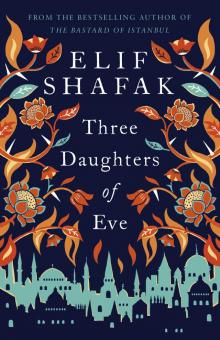 Three Daughters of Eve
Three Daughters of Eve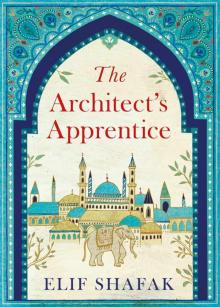 The Architect's Apprentice
The Architect's Apprentice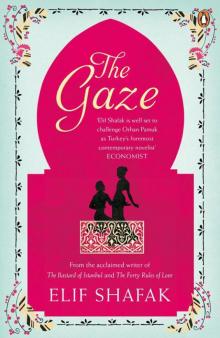 The Gaze
The Gaze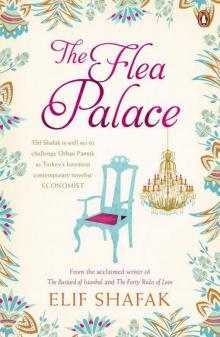 The Flea Palace
The Flea Palace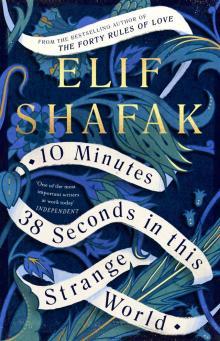 10 Minutes 38 Seconds in this Strange World
10 Minutes 38 Seconds in this Strange World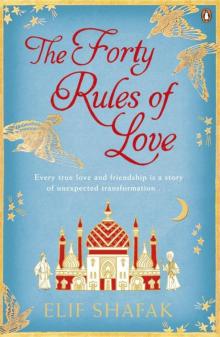 The Forty Rules of Love
The Forty Rules of Love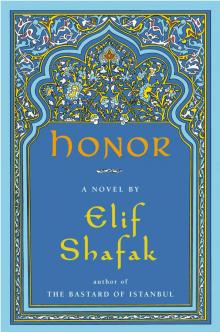 Honor
Honor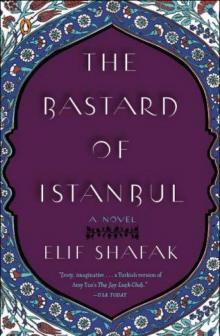 The Bastard of Istanbul
The Bastard of Istanbul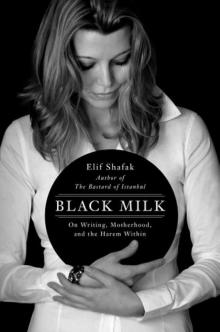 Black Milk
Black Milk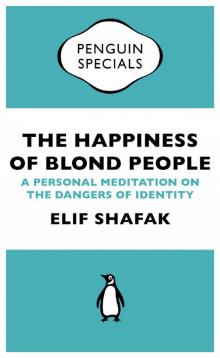 The Happiness of Blond People (Penguin Specials)
The Happiness of Blond People (Penguin Specials)